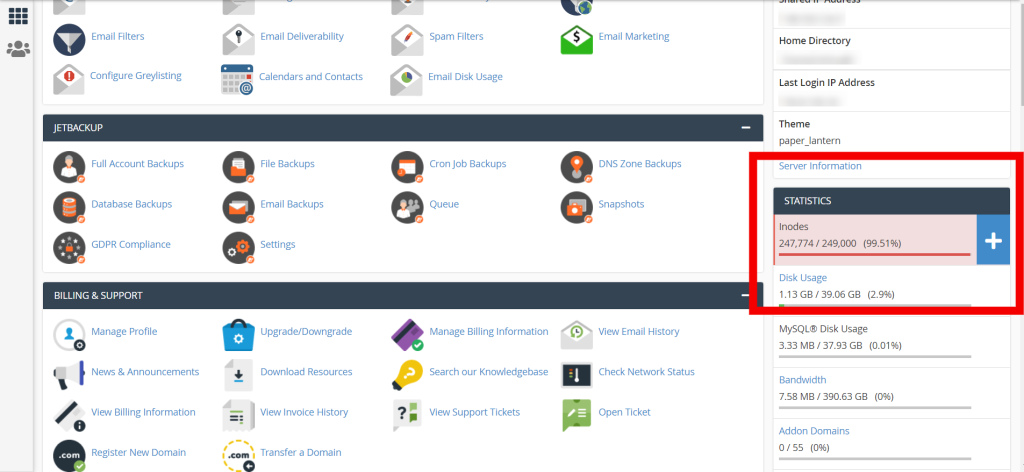An inode (index node) is a data structure that stores important information and attributes about all the files or directories on your hosting. Each file or directory counts as one inode, and since the Web and Cloud hosting plans have a set maximum number of inodes, it is important to keep your inode count below the limit.
In web hosting, an inode is a data structure used by the operating system to store information about files and directories. Each file or directory on a server is represented by an inode, which contains metadata such as file permissions, ownership details, timestamps, and pointers to the actual data blocks where the file’s contents are stored on the disk.
The usage of inodes in web hosting is crucial for several reasons:

- File Management: Inodes serve as a fundamental component of file management on a server. They provide a systematic way to organize and track files and directories, allowing the operating system to locate and manipulate them efficiently.
- Metadata Storage: Inodes store essential metadata associated with files and directories. This metadata includes information such as:
- File permissions: Specifies who can read, write, or execute the file.
- Ownership details: Indicates the user and group that own the file.
- Timestamps: Record the file’s creation, modification, and access times.
- File size: Specifies the size of the file in bytes.
- Pointers: Direct the operating system to the data blocks containing the file’s actual content.
- Efficient File Access: By storing file metadata in inodes, the operating system can access and manipulate files more efficiently. Instead of searching the entire disk for a file’s attributes, it can quickly retrieve them from the inode associated with the file. This streamlined access mechanism contributes to faster file operations and improved server performance.
- Resource Management: Web hosting providers often impose inode limits to manage server resources effectively. An inode limit specifies the maximum number of inodes that a user’s account can utilize. Exceeding this limit can lead to issues such as inability to upload files, email delivery problems, or restricted functionality. By monitoring inode usage and adhering to inode limits, hosting providers can ensure fair resource allocation and prevent abuse.
Overall, inodes play a critical role in web hosting by facilitating efficient file management, metadata storage, and resource management on servers. Understanding inodes and their usage is essential for web hosting users to effectively manage their hosting environment and optimize server performance.
Managing Inodes in Web Hosting:

To effectively manage inodes in web hosting, consider the following strategies:
- Regular Cleanup: Periodically review your files and directories to identify and remove unnecessary or redundant items. Delete obsolete files, temporary backups, and unused plugins to reduce inode usage.
- Optimize File Storage: Consider consolidating small files into larger archives or merging directories with few files. This optimization can help reduce inode consumption by minimizing the number of individual entries.
- Monitor Usage: Keep track of your inode usage through your hosting control panel or server management tools. Monitoring usage levels allows you to stay within your allotted inode limit and avoid potential disruptions to your hosting services.
- Upgrade Hosting Plan: If you consistently approach or exceed your inode limit, consider upgrading to a hosting plan with higher resource allocations. Upgrading provides additional headroom for file storage and allows for continued growth without encountering inode-related restrictions.
Conclusion:
Inodes play a crucial role in web hosting by facilitating efficient file management and organization on servers. Understanding inodes and managing inode usage effectively are essential for ensuring optimal performance and reliability of web hosting services. By adhering to inode limits, practicing regular cleanup, and optimizing file storage, web hosting users can maintain a well-organized and smoothly functioning hosting environment.
